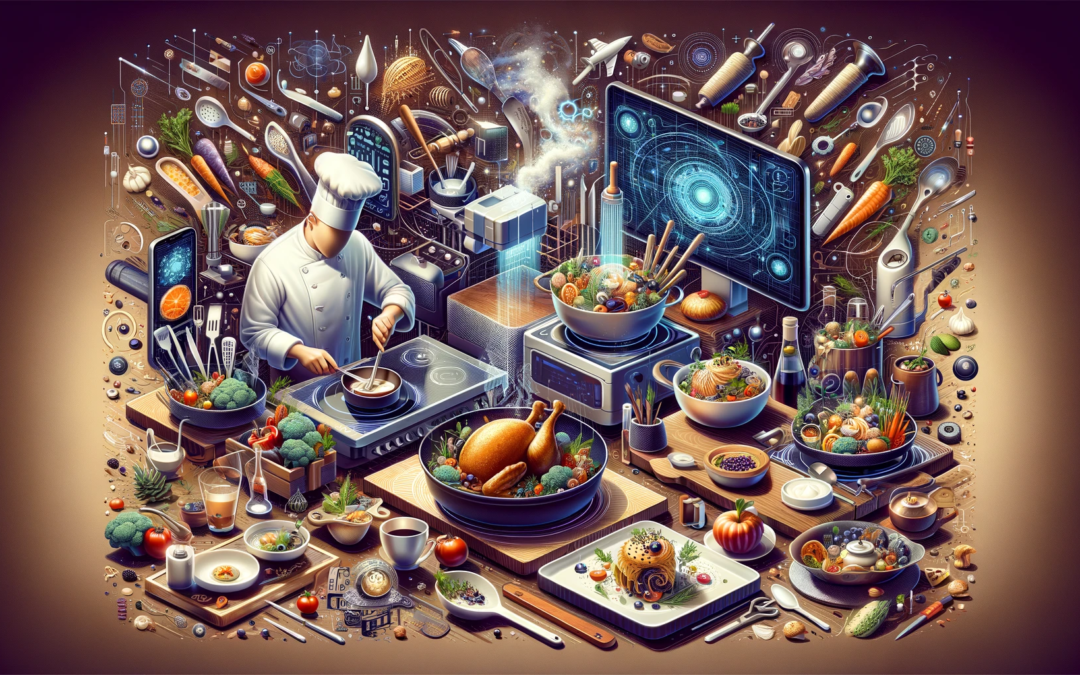The culinary arts have long been a cherished tradition, with chefs and food enthusiasts constantly pushing the boundaries of flavor and presentation. However, in recent years, a new player has entered the kitchen – artificial intelligence (AI). With the advent of AI, the culinary world is experiencing a revolution like never before. In this blog post, we will explore the exciting ways in which AI is transforming the culinary arts, from recipe creation to personalized diet planning.
AI in Recipe Creation and Optimization
Imagine a world where AI algorithms work alongside chefs to create innovative and mouthwatering recipes. This is no longer a distant dream, as AI is already being used to generate new recipes and optimize existing ones. By analyzing vast amounts of data on flavor profiles, ingredient combinations, and cooking techniques, AI can suggest novel recipes that push the boundaries of culinary creativity. Not only that, but AI can also optimize recipes for nutritional value and sustainability, ensuring that every dish is not only delicious but also good for our health and the planet.
One fascinating example of AI collaboration in the culinary world is the partnership between IBM’s Watson and the Institute of Culinary Education. Together, they have created a cookbook called “Cognitive Cooking with Chef Watson,” which features recipes developed by AI. These recipes combine unexpected ingredients and flavors, resulting in unique and delightful dishes that challenge traditional notions of taste.
Personalized Nutrition and Diet Planning
We all have different dietary needs and preferences, and AI is here to help us navigate the complex world of nutrition. By analyzing individual health data, dietary restrictions, and personal preferences, AI-driven apps and platforms can offer personalized dietary recommendations. Whether you’re following a specific diet or trying to achieve certain health goals, AI can provide tailored advice to help you make informed choices.
For example, the app “Foodvisor” uses AI to analyze food photos and provide users with nutritional information. Simply snap a picture of your meal, and the app will identify the ingredients and calculate the calories and macronutrient content. This kind of personalized nutrition guidance empowers individuals to take control of their health and make informed decisions about their diet.
AI in Food Supply and Sustainability
AI is not only transforming the way we cook, but also how we source our ingredients. By analyzing data on food production, distribution, and consumption, AI can help optimize the food supply chain, reduce waste, and promote sustainable practices. For instance, AI technologies are being used in agriculture to monitor crop health, predict yields, and optimize irrigation and fertilization. This not only increases efficiency but also reduces the environmental impact of farming.
One notable example is the company “Apeel Sciences,” which uses AI to develop a natural coating for fruits and vegetables, extending their shelf life and reducing food waste. By harnessing the power of AI, we can work towards a more sustainable and environmentally friendly food system.
Culinary Training and AI
AI is not just changing the way we cook, but also how we learn to cook. Virtual cooking lessons and technique analysis are becoming increasingly popular, allowing aspiring chefs to learn from the best without leaving their own kitchen. AI-powered platforms offer interactive tutorials, personalized feedback, and even virtual reality experiences, making culinary education more accessible and engaging than ever before.
Culinary schools and training programs are also integrating AI into their curricula. Students can now benefit from AI-driven tools that provide real-time feedback on their cooking techniques, helping them refine their skills and unleash their creativity. The marriage of AI and culinary education is shaping a new generation of chefs who are well-versed in both traditional techniques and cutting-edge technology.
Challenges and Ethical Considerations
While the integration of AI in the culinary arts brings many benefits, it also raises important challenges and ethical considerations. One such concern is the preservation of culinary heritage and cultural authenticity. As AI pushes the boundaries of taste and flavor, we must ensure that we don’t lose sight of the traditional cooking methods and cultural significance that make our culinary experiences so rich and diverse.
Another consideration is the potential impact on employment in the culinary industry. As AI becomes more advanced, there is a possibility that certain tasks traditionally performed by chefs could be automated. Striking a balance between AI innovation and preserving job opportunities is crucial to ensure a sustainable and inclusive future for the culinary arts.
The Future of AI in Culinary Arts
As we look to the future, the possibilities of AI in the culinary arts seem endless. Will we have AI-powered robotic chefs preparing gourmet meals in our homes? Will virtual reality dining experiences become the norm? These are questions that only time will answer. What is certain is that AI will continue to push the boundaries of culinary creativity, transforming the way we cook, dine, and experience food culture.
Engaging with the Audience
We would love to hear your thoughts on the role of AI in the culinary arts. Have you tried any AI-driven cooking platforms or dietary tools? How do you envision the future of cooking and dining in the age of advanced technology? Share your experiences and join the discussion in the comments below!
Conclusion
The integration of AI into the culinary arts is revolutionizing the way we cook, create recipes, and experience food. From AI-generated recipes to personalized nutrition guidance, AI is reshaping the culinary landscape in exciting and innovative ways. As we embrace this blend of technology and culinary creativity, we can look forward to a future where the possibilities in the kitchen are truly limitless.
Images:
[Insert relevant images or graphics showcasing AI-inspired culinary creations and technologies]
Infographics:
[Insert infographics illustrating AI’s impact on recipe development, nutrition, and food sustainability]










